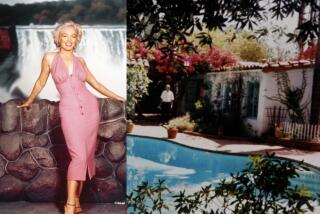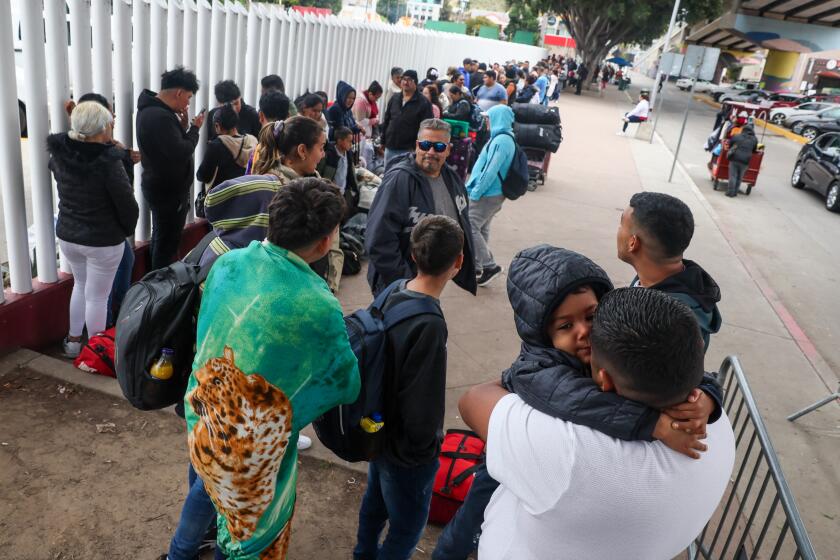We had good company in our camp, all the people in Japanese town . . .
Margarita Hirata spent most of World War II in a relocation center for Japanese, even though she was a Mexican citizen. She is now a U.S. citizen and works in the Retired Senior Volunteer Program in Thousand Oaks.
I was born in Mexico City, 1899. For some reason I lived with my grandmother. In 1915 there was shooting right in the streets of the city. That’s when she decided it was time to go. When we got to Veracruz, there was no way of getting out. So she found a boat where they were taking men for the army, and they gave us a ride. From there we took a train to Laredo, Texas. I didn’t come to New York with the beautiful Statue of Liberty. I always wished I had. I haven’t seen that little lady.
In 1919 Grandma decided to come to California. I was 19 and Grandma was getting older, so I started working. And that’s when I met my husband, George. He used to come to the Japanese dry goods store, where I worked, to write English and Japanese letters and take care of the books. We married in 1923.
A lot of people would ask me, “Why did you marry a Japanese man?” All those beautiful young Mexican men who wanted to date me didn’t know how to write their name. During the government of President Diaz, the kids didn’t go to school. I said, “What am I going to do with a man who doesn’t even know how to write his name?” And then my husband was so neat and so nice. He was a good choice. He was a good husband, a good father and a good worker.
In ‘41, when the war started, my husband was let go from his job. The government gave us notice that we would have to go to camp. The first of January, my son Manuel joined the Marines. He thought that when he gave his services to his country they would be a little more considerate of his father. The government was trying to help certain families, but when the Army took over, they said, “Anybody with one Japanese drop of blood has to go to camp.”
As soon as Louis, my second boy, was 18, he joined the Army. Louis went to Europe, and Manuel went to the Pacific. Manuel was wounded on Tarawa, and I got permission to go to San Diego and see him in the hospital. After the war Louis stayed in the Army. The Korean War started, and he was killed there.
In March of 1942 they came to get us. We didn’t have any money because all this time my husband hadn’t been working. I took one little suitcase, and I put all the rest on a big spread and tied it up, and that’s the way we went.
They took us to Camp Poston in Arizona. We stayed there for four years. We had good company in our camp, all the people in Japanese town, pharmacists, doctors, dentists, ministers. It was nice.
The first year was pretty hard. We didn’t know what was going to happen, and I was very sick. Everybody was worried. But, you know, you get used to everything. In a way, I think it was better that we were there. Nobody bothered us. Before we went to camp, they beat my husband one day and took his rings and his watch and his money. He came home--oh, I don’t want to remember that. I thought, “Well, we’re here; we’re safe.” It was a terrible thing in a way, but we had a home, and we had food.
My husband died in 1962. He was 63 years old. I was 62. One morning I was getting ready to go to camp with the Girl Scouts. He got up about 6 o’clock, and he got the newspaper off the porch, and he went to bed to read. He just dropped the newspaper on his face and went to sleep. I was calling him, “Daddy, I’m going to go to camp, you’d better get up, otherwise you’re going to be late.” I kept calling him from the bathroom, but he was gone. I’ve been a widow 25 years.
It’s been a wonderful life, but I miss him. Sometimes I still think about him. When I’m having a good time, I say, “See, why did you leave me? You could be having a good time right now.” But such is life. I’m a happy girl, you know. I’m a very lucky girl. Everybody loves me.
More to Read
Start your day right
Sign up for Essential California for news, features and recommendations from the L.A. Times and beyond in your inbox six days a week.
You may occasionally receive promotional content from the Los Angeles Times.






